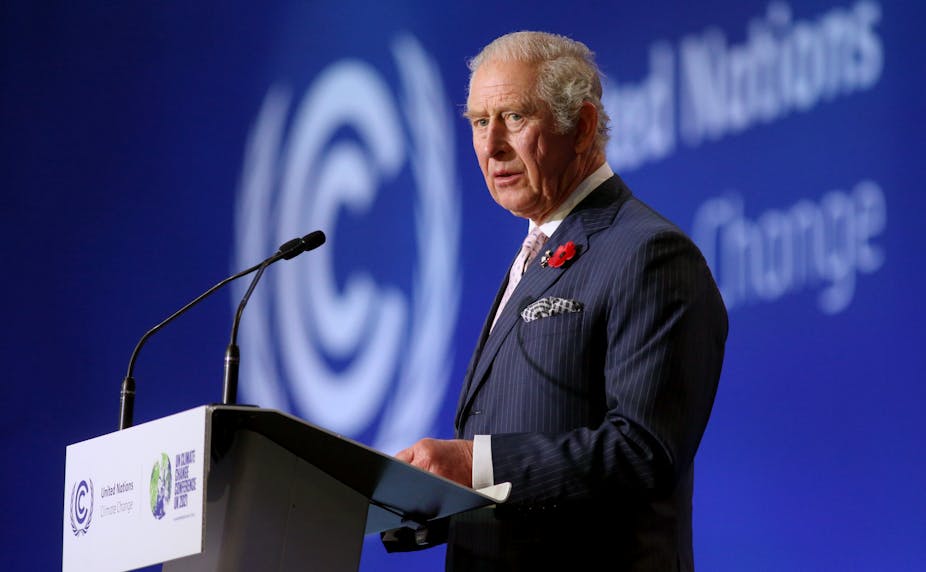King Charles is a committed environmentalist. Aged 21, he gave a speech to the Countryside Steering Committee for Wales warning against the environmental cost of oil pollution and plastic waste.
He has since spoken on environmental issues at the European Parliament and at global conferences. At the UN climate summit COP26 in 2021, he spoke formally about the role of the private sector in accelerating the transition to net zero.
The film and fashion industries have demonstrated that “star” figures can mobilise their popularity to generate media attention and, if used appropriately, can create the context for positive discussion. Hollywood actor Leonardo DiCaprio has used his stardom to promote environmental action effectively. In 1998, DiCaprio was invited to the White House to discuss the climate crisis with then US vice-president Al Gore.
But now he is king, Charles’s position has changed. It is widely considered unacceptable for the monarch to directly express personal opinions. There are clear political questions associated with influential but unelected figures advocating for policies in a democracy where representatives are elected to make such decisions. Comparisons with other prominent environmentalists such as Dicaprio have therefore diminished.
Charles has had to reconsider his approach to environmentalism. He agreed not to attend the COP27 summit in Egypt this year, and has not deviated from the official position that this decision was made by mutual agreement with Liz Truss, then prime minister. But some royal commentators have speculated that the King was disappointed as he had hoped to deliver a speech to delegates.
Environmental activism
In the past, Charles has used his influence to advocate for climate action overtly. In 1992, the landmark UN Earth Summit was held in Rio de Janeiro. It was the first time in 20 years that UN member nations had convened to discuss environmental issues.
A year before that summit, Charles hosted an informal reception off the coast of Brazil for delegates on the royal yacht Britannia. The guests included Brazilian president Fernando Collor de Mello and US Environmental Protection Agency administrator William K. Reilly.
It was reported that Charles challenged officials and business leaders over the role of their respective countries at the impending Rio summit. He later called for the same people to show “vision and courage” at the summit.

Thirty years on, the King has shown recognition that his new position necessitates a change in his approach to environmental campaigning. On his accession to the throne, he acknowledged that he could not devote as much time to all of his associated charities. Instead, he has changed his strategy to one that involves encouraging and directing the discussion of environmental issues.
Charles used his scheduled programme of visits and events on a recent tour of the UK to engage with businesses and community leaders over environmental issues. He visited the Bradford head office of the supermarket chain Morrisons, for example, to hear about its sustainability schemes.
By endorsing green initiatives such as the Queen’s Green Canopy Project, Charles has encouraged public engagement with small-scale environmental solutions. The initiative, which has been extended to March 2023, involves nationwide tree planting projects in commemoration of the Queen.
He has also passed some of his environmental work, including on rainforests and species conservation, to Prince William. Charles’s eldest son has his own track record of engaging with environmental issues, including launching the Earthshot Prize in 2021, which rewards innovative solutions to environmental issues.
Convene and capitalise
Illustrating the King’s newly refined approach to environmentalism is his use of his new position to bring together prominent public figures, such as political leaders, on the promise of a highly visible platform.
In early November, 200 politicians and campaigners gathered at Buckingham Palace for a pre-COP27 reception. Among the attendees were Alok Sharma, a committed climate negotiator and president of COP26, and John Kerry, the former US secretary of state and current climate envoy. Kerry was instrumental in the creation of the Ross Sea marine protected area in Antarctica in 2013.
As well as politicians, the reception was attended by guests from business including the fashion designer and environmental campaigner Stella McCartney. This allowed Charles to convey the message that environmental issues are a shared responsibility, reinforcing the theme that members of the private sector can also be catalysts for environmental action.

Surrounded by environmental campaigners and thought leaders, the UK’s new prime minister, Rishi Sunak, was prompted to speak at the reception on the need for urgent climate action.
Sunak alluded to the “desperate inheritance” we are leaving our children by failing to act immediately on climate change. He also adopted the political language used by Charles in the past, acknowledging that human suffering will worsen if we continue to allow climate change to “ravage our planet”.
The King has in the past expressed his frustration with the lack of concrete action and binding commitments at climate conferences. But the pre-COP27 reception demonstrates that he has refined his operating procedure. His approach is to “convene and capitalise” in order to continue engaging with environmental issues, despite the constraints imposed by his new role.

